Willkommen zum YES MOOC-DE!
YES - Youth Engagement in Society

In diesem MOOC werden wir Informationen zur Nutzung des Serious Game YES anbieten. Dieses Spiel ist ein freies und kostenloses Dabattier Spiel (dabating game, das Sie ohne Kosten einfach nutzen in in Kursen oder Klassen einsetzen können.
Sie finden das YES Serious Game hier: http://yes-cards.dev-lg.de/
Dieser MOOC wurde im Rahmen des Projekts YES erstellt.
YES ist ein Akronym für "Youth Engagement in Society".
Bei YES handelt es sich um ein internationales Projekt im EU Bildungsprogramm ERASMUS+.



Informationen über den YES MOOC
In diesem Bereich finden Sie Informationen zur Haupt-Zielgruppe, den Zielen des Moocs, den Lern-Outcomes und der Idea und den Strukturen des YES MOOC.
Hauptzielgruppe
Wesentliche Zielgruppen des MOOCs sind:
- Jugendarbeiter / Youth Workers
- Jugend-Bildungsinstitutionen und Lehrkräfte
- Jugend-Organisationen
- YES Nutzer
- Menschen, die einfach an Serious Games interessiert sind
Ziele des YES MOOC
Die Ziele dieses MOOCs sind
- Einblicke in das YES-Tool für Jugendarbeiter / Youth Workers, Jugend-Bildungsinstitutionen und Lehrkräfte sowie Jugend-Organisationen anzubieten.
- Information darüber anzubieten, wie das Serious Game in Bildungskontexten genutzt werden kann.
- Beschreibung der Diskussionsmodelle, die vom YES Tool unterstützt werden.
- Beispiel-Screens zeigen.
- Pädagogische und didaktische Hinweise geben.
- Diskussionsideen und -themen teilen.
- Aufmerksamkeit wecken für die Nutzng von Serious Games in der Jugendbildung.
Lern-Outcome
Die Lernenden/ Zielgruppe dieses Moocs wird
- die Regeln und die Diskussionsformate von YES kennenlernen.
- wir mit dem Konzept von Serious Games in Berührung kommen.
- Aufgaben lösen, die ein vertiefteres Wissen um das YES Card Deck Spiel ermöglichen.
- auf Europäische Themen als Beispiel von möglichen Themen für YES Diskussionen fokussieren.
- die Wege von Jugend-Trainings und klassischen Bildungsangeboten überdenken.
- etwas über das ERASMUS+ project YES lernen.
Ziele und Struktur des YES-MOOC
Dieser MOOC wird es Jugendarbeitern / youth workers erleichtern das YES tool zu finden und zu erlernen, wie es zu nutzen ist. Zudem wird deutlich wie den Lernenden produktive Debattier Kompetenzen nahegebracht werden können, die wichtig sind um an Politik teilzuhaben oder eine Aktive Europäische Staatsbürgerschaft auszuleben. Sie, die Trainer und Jugendarbeiter, sollen in die Lage versetzt werden eine Idee zu bekommen, warum YES ein gutes und nützliches Serious Game für Jugendgruppen ist. Das ist der Grund, aus dem wir entschieden habenInformationen und Lernaktivitäten zu folgenden Bereichen zu bieten: > die Idee von YES > die Spielformate und Settings > Die Kartentypen und eine Einführung in die Demo Kartensets > die Struktur und der Ablauf des Spiels (Screenshots und Beschreibungen) > die Wichtigkeit der Vorbereitung und Nachbereitung des Spiels > der Link zu unserer Website und zum YES Tool
So, auf geht´s!
Einführung
Wenn wir über moderne und innovative Lernmethoden sprechen, werden spielbasierte Ansätze und ernsthafte Spiele immer beliebter und dabei hat jede Generation ihre eigenen Bedürfnisse. Die Jugendlichen leben heute in einer sich schnell verändernden digitalen Welt. Sie sind an moderne Technologie gewöhnt und alte traditionelle Formen des Lernens werden nicht als so attraktiv angesehen wie früher. Aus diesem Grund ist das digitale spielbasierte Lernen im Laufe der Jahre immer beliebter geworden. Ein Blick auf die Nutzung von Smartphones, Tablets und Computern im Jugendalltag liefert dafür mehrere gute Gründe. Der YES-Ansatz, den wir in diesem MOOC vorstellen, ist eine solche innovative Lernmöglichkeit, die den Veränderungen der Möglichkeiten und der Umwelt Rechnung trägt: YES ist ein ernstes Spiel - ein Serious Game -, das Diskussionen unterstützt. Lernen geschieht immer mit den Ressourcen und Materialien. Darüber hinaus finden Lernprozesse in der Regel zeitlich begrenzt statt. Insgesamt lässt sich feststellen, dass die Rahmenbedingungen für das Lernen sehr unterschiedlich sind. Zudem ist es Aufgabe der Jugendarbeiter, Lehrer und Trainer, die jungen Lernenden vorzubereiten. Die Lernenden befassen sich mit neuen Medien in ihrem täglichen Leben und sind in ein europäisches internationales Umfeld eingebunden. Sie müssen sich also mit den Chancen und Herausforderungen auseinandersetzen, denen sie in ihrem realen Lebensumfeld gegenüberstehen. Die Jugendlichen sind in Situationen der Gesellschaft und des Arbeitsmarktes eingebettet und dort haben mobile Geräte und neue Medien bereits einen festen Platz. Sie sind Standard und Teil eines zunehmenden Trends der Digitalisierung. Die Lernenden sollten auf Standardsituationen vorbereitet sein. Aus diesem Grund haben wir beschlossen, Lehrern und Ausbildern mit dem MOOC udn dem Spiel Informationen über neue Entwicklungen und den Umgang mit mobilem Lernen in Lehr- und Lernszenarien zur Verfügung zu stellen. Die Lehrer müssen sich mit neuen Medien und innovativen, spielbasierten Lernansätzen vertraut machen. Also: Willkommen im YES-MOOC.
Über das ERASMUS+ YES Projekt
Dieser MOOC betrachtet das YES Serious Game. Dieses Spiel wurde im Rahme des YES Projekts entwickelt.

Das Projekt wurde mit Mitteln der Europäischen Union kofinanziert:

Um mehr Informationen zu diesem Projekt zu erhalten gehen Sie bitte auf die YES Projekt Website:
Das Kernziel von YES?
Das Ziel von YEs ist es, ein spielbasiertes Online-Tool und -System (wie ein Kartenspiel: als Deck-Spiel) zu entwickeln, zu implementieren, zu testen und zu bewerten, um europäische Themen in Teams zu diskutieren. In YES ist das vorgeschlagene System ein spiel-basiertes Werkzeug in Form eines ansprechend animierten Online-Kartenspiels, das Debatten über Politik und Gesellschaft unter Jugendlichen anregen soll. Jugendliche bilden Teams, die aus Schulklassen oder gemischten internationalen Teams bestehen können.
Das System bietet im Wesentlichen ein Online-Umfeld für gut strukturierte Debatten über gesellschaftliche oder politische Themen, die einen Gamification-Ansatz nutzen, um junge Menschen unterschiedlichen Alters zu ermutigen, sich zu engagieren. Daher nutzt es einen Kartenspiel-Mechanismus, der es den Lernenden ermöglicht, Teams zu bilden, die gegeneinander spielen. Dies bildet die Basis des Systems.
Warum kreieren wir ein Spiel/Tool mit solch einem spezifischen Thema?
Aufgrund der aktuellen politischen Ereignisse wie Terroranschläge an verschiedenen Orten, BREXIT, der Euro-Krise oder dem Migrationsproblem ist es von besonderer Bedeutung, dass die Jugendlichen erkennen, dass sie als Bürger Europas Einfluss auf die Zukunft und damit auch auf Europa haben. Sie müssen verstehen, dass sie als eine Einheit die Zukunft Europas erschaffen können, oder noch wahrscheinlicher, dass sie selbst die Zukunft Europas sind. Dies bedeutet, dass sie sich beteiligen sollten, um das Leben zu führen, das sie in Zukunft wollen. Um dies sicher zu stellen, wäre es eine spielerische Möglichkeit, ihr Wissen und ihre Meinung zu bestimmten europäischen Fragen mit dem YES-Tool zu erweitern. Ein Weg dies zu gewährleisten, könnte es sein, dass sie in die Diskussion gegenwärtigen Situation in Europa einbezogen und integriert werden.
Die Hauptidee von YES? Das YES-Tool bietet eine Lernmethode im Bereich des spielbasierten Lernens - game-based learning. Die Grundidee des Serious Games Spiels YES im Projekt besteht darin, eine aktive Bürgerschaft zu fördern und Informationen über Europa bereitzustellen sowie aktive Arbeit und Diskussion über einen spielbasierten Ansatz anzubieten. Die Idee ist es, dass die Teams ihr eigenes Kartenspiel mit verschiedenen Aussagen vorbereiten müssen, die geeignet sind, die eigene Position zu stärken oder zu verteidigen, indem Karten mit speziellen Funktionen (wie Argument und Gegenargument) erstellt werden. Dies macht das gesamte System sehr flexibel, da es keine Begrenzung in der Anzahl der Teams gibt, die gegeneinander spielen, und auch nicht in der Anzahl der jungen Leute, die sich zusammentun, um ein Team aufzubauen. "Spiele und Serious Games sind auch ein wichtiger Teil der Jugendarbeit. Sie bieten eine Chance, dass Menschen sich kennen lernen, Spaß haben und dass engagierte Jugendliche entstehen. Aber sie haben auch einen wichtigen Aspekt hinsichtlich der Bildung, basierend auf Prinzip des Lernens." (Beutner, Jakunaite , Rüscher 2018 - Original in Englisch)
Das aims of YES: Which skills and competences will be fostered with YES?
First of all the young learner get topic related knowledge. They will discuss a specific topic when they use the YES tool. The topic can be selected by the youth workers / trainers and the learners. So the learners gather knowledge and competences and become skilled in the chosen topic. YES focused European Citizenship and politics by creating the demo Card Decks in this fields. For young European people it is useful and important to become active citizens, to know about European ideas, European culture and co-operation. But, the youth workers and learners can also integrate other topics in the game. Beside of the knowledge about the selected topic which will be discussed through YES, youngsters will also gain very important additional competencies:
- Cmmunication in the mother tongue
- Communication in foreign languages
- Mathematical competence and basic competences in science and technology
- Digital competence
- Learning to learn Competence
- Social and civic competences
- Sense of initiative and entrepreneurship
- Cultural awareness and expression
What kind of debating models does YES offer?
An aim of YES is to foster certain competences and skills of youth through team interactions throughout the game. To debate/discuss various topics, in this case on the EU, enables the youth to develop or train specific skills and competences.

Discussion model, representative model as well as the election model.
- In the discussion model one team will play against another team to win the game. A discussion with pros and contras of a certain topic will take place. One team taking the pro-side as the other team takes the contra-side.
- In the representative model a debate with up to five different teams will take place. Each team will be represented by a single person which will argue on a certain position regarding a pre-determined topic. Such a setting is comparable to a talk-show or TV debate.
- In the election model a debate with up to five different teams will take place to simulate an election, this has to be handled in some kind of split-session by the tool.
Multiple-Choice concerning dicussion models
How many discussion models do we have in the Serious Game YES? (!1) (!2) (3) (!4)
...
Text task concerning Card Deck Games
"In the YES Serious Game we are learning to prepare discussions and discuss topics within a Card Deck Game.
A Card Deck Game is very common between young learners. The know it from breaks at school and from the playground.
Examples for other popular Card Deck Games are the game Magic from the US, or the Pokemon from Japan."
Using the YES Serious Game
YES is unique because it is the first time active citizenship is fostered by a game-based approach based on a deck-building card game.
There are some measures and projects which focus on active citizenship like (CIAC- CIAC – Creativity and Innovation for active citizenship,, CIVIC MIMDS, GOAL – Granting Opportunities for Active Learning, PPP - People Power Participation,VOICE – Developing citizens etc.) but the always stick to traditional courses or concept design. Only a few focus on online learning but this is typically not done in a synchronous way in these approaches. Moreover, none of these approaches include real game-based approaches and innovative online debating systems (we did a research on 30 project about active citizenship - you can find them under http://de.youropa-project.eu/projektauswahl/30-ausgewahlte-projekte/).
But YES uses game aspects which are focusing on elements of deck-building card games with which the learners are typically familiar with and combines this with learning about Europe and active citizenship.
The young people are used to playing deck-building card games or collectable card games with real cards such as POKEMON, Yu-Gi-Oh, Digimon, Magic theGathering, StarWars, Game of Thrones, etc. or on online platforms or apps (ASCENSION, DECK Heros etc.).
We use the motivational aspect of such a game structure which is played by millions of young kids and youths over Europe and put it in a completely new context.
Multiple-Choice concerning the use of YES
What is special about YES? (!YES is a traditional eLearning approach) (YES is a serious game which fosters the motivation.) (!YES is a video approach.) (!YES is a game with real paper cards.)
...
How the debate works
The objective of the YES is to encourage productive debates that authentically reflect the way how societal or political debates take place in real life, always having the claim to foster learning about the discussed topics in mind. There are three steps to take in the YES approach and the use of the YES game:

Hence, the first step to do would be to prepare the debate.
Research on the topic = Preparation phase
Therefore, the learners conduct research to the debate's topic, they search for background information and facts, and they have to prepare arguments and counter-arguments that will then be written down on the cards. Here, the learner gather knowledge and competences in the field they have to discuss.
This requires the learners to anticipate the argument and counter-arguments of the other teams as well which pretty much implies the extent of research necessary to undertake by each of the teams, particularly when playing with more than only two teams. But this also shows that the research process itself and all of its outcomes are highly valuable for the learners, which is why resources of high quality, prepared materials, summaries that have been created, etc. should be stored and kept available. Prepared materials that weren't a part of the cards could also be made available to other learners or even teachers as some kind of Open Educational Resource.
The debate = discussion and game phase
In the second phase the debate itself starts after the preparation took place. When thinking of a debate in which a pro- and a contra-team compete against each other, the one side could start with an argument for their side. The other team could play a card with a counter-argument that specifically targets the argument that was drawn before. Deciding which card to play is a democratic process which has a time limit (as mentioned in the noted above). When it's the team's turn the members can choose which card to play and once they have a majority the card will be turned over and added to the official timeline of the debate. This will encourage discussions among the team members. At the end of each game can be public voting (election model). Instead of just asking to vote for a winner the trainer also should focus the votes on the quality of the elements produced and how well they compare against the other one. This way we can come up with a point system that will tell us who won the debate at the end of all the rounds.
The debriefing = reflection phase
The reflection is an important part for youth groups as well. The trainers discuss with their youth groups the discussion and the argumentation path. They reflect on the topic and share experiences. If the learners were for example discussion a European topic this is the point were additional material can be provided becaus enow the group is open for news and is able to improve theri arguments, ideas and can enhance their competences and knowledge. Moreover, different views and positions can be taken into account and a reflection about argumentation strategies can be provided.
General hints and technical aspects
The fact that teams will have to anticipate the arguments of the other side means that they will have to look at the debated topics from more than one side in order to be successful. Not only will they learn structured, respectful and productive debating skills, they will also develop a deep understanding of the topics that they debate.
From a technical point of view the system is hosted on a server. There is no need to download software or plug-ins because the system will run in every modern browser and is therefore, easily accessible.
Multiple-Choice concerning the YES debates
How many phases are there in a typical use of YES? (!1) (!2) (3) (!4)
...
The YES Cards of a deck
There are different types of Cards in the YES Card deck game:
The core dabating cards
Argument cards: to provide a first argument in a dabate
Counter argument cards: to provide an answer to a giver argument and provide a new own argument based on that
The special cards
Time card: to get some time to do additional research before providing an answer
Lie Card: Lying and Protesting it looks like a core dabating card and offers the chance to provide a wrong statement for example a so called ´scientic information´ which fosters your argumentation but which is not real and correct. If this card is played the other group can uncover it by a protest:
- If the protest is correct and it was a lie. The lying group looses the round of the debate immedialtely.
- If there is a protest and the card played was not a lie card but a real argument the protesting group looses immediately.
- If there is no protest the card is like a real argument.
Stealing Card
offers the opportunity to steal a dabating card of the other group
Destroying Card
offers the opportunity to destroy a card you like of the other group which gets out of the debate
Recycling Card
offers the opportunity to get back an agurment you already played
Crossword concerning cards
Click with your mouse on the numbers of the crossword and you will get a dialog with the Question and a chance to fill in the correct answer.
| Lie | If you play this card the other group will be able to protest against it! |
| Destroying | If you play this card you will delete a card of the enemy group! |
| Stealing | If you play this card you will take a card from the opponent! |
| Time | If you play this card you won´t have to hurry any more! |
| Recycling | If you play this card you will be able to get an already played card back! |
How to register for the YES Serious Game
Video - How to register for the YES Serious Game
Find here a video concerning the registration at the YES Game:
Search and Find concerning the registration
- Find the words! (horizontal, vertical and diagonal)
- To show a word, just go with your mouse on it and mark it.
- Help: We are searching for the words: Serious, Game, register, name, email, gamemaster, YES, and login.
| Serious |
| Game |
| register |
| name |
| gamemaster |
| YES |
| login |
...
Video: Introduction to the YES Serious Game
Find here a video concerning the YES Game and how it works. It provides information how to play it:
Screenshots from the YES Serious Game
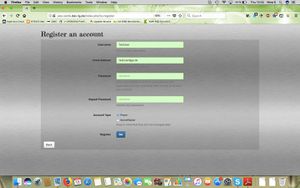


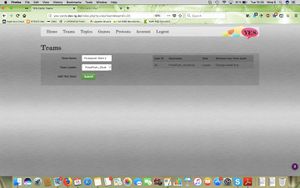
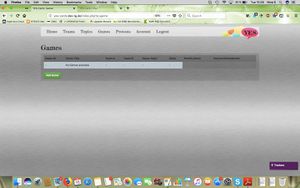


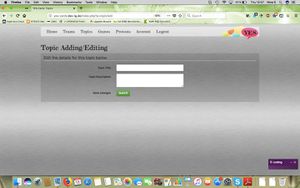
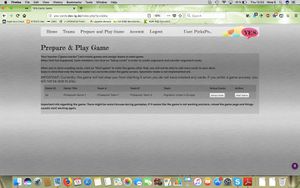
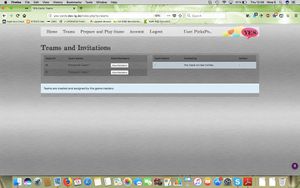
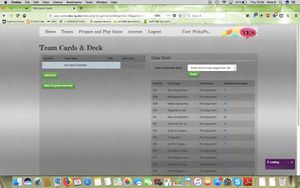

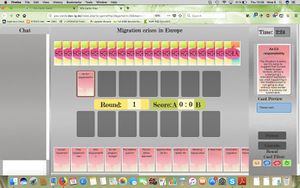

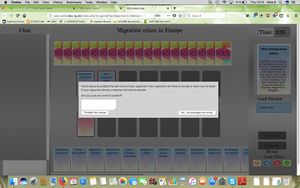
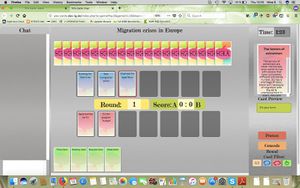
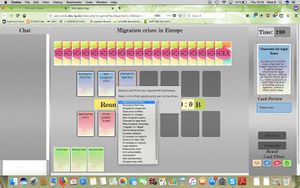
Good bye and the link to the YES Serious Game
Thank you for your interest in the YES MOOC.
Now enjoy the MOOC Game.
Just follow this Link to the YES Serious Game: